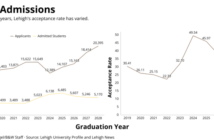
In this Aug. 28, 2015, file photo, President John Simon sits at his desk as Lehigh’s 14th president. President Simon just recently announced plans to expand the College of Health at Lehigh over the next couple of years. (Chris Barry/B&W Staff)
For his radio show “Prof. Talks” on WLVR, Austin Katz sat down with President John D. Simon to discuss his first year on campus, the new health college and the importance of data literacy.
Q: You’re kind of embedded with my class, the class of 2019. We started at the same time, so how did your first year at Lehigh go? Was it what you expected?
John Simon: I had a great time my first year. I really enjoyed getting to know students, faculty, staff, alumni (and) traditions at the university. I’ve had a very enjoyable first year. In some ways, I wondered what it was going to be like to really live on campus and to really not have a whole lot of privacy, but I’ve really enjoyed living on campus since it allows me to go to a lot of student events. In others, I was surprised — there’s an awful lot of travel. You spend a lot of time on the road, meet a lot of alumni, state and federal government people who work in industries, so there’s just a huge component of travel that I sort of knew about but didn’t realize what it’d be like to live.
Q: You looked at student feedback in the CORE report, which is a data collection of students and faculty (responses) about how the university could be improved. How are you implementing the results from the CORE report?
JS: There were a lot of suggestions around making the institution more welcoming for international students that are currently being implemented. Issues around graduate student housing and the lack of availability for students near campus have several projects being discussed with developers in the South Side that will be addressed in the next couple years. The undergraduate recommendations — largely some of them make sense and some of them don’t. We’ve tried to integrate the thinking and how we’re approaching growth at the university and what type of residential communities we’d want to build to support that growth.
Q: There’s the recent announcement to expand into the College of Health. Can you elaborate on that?
JS: I think the faculty at Lehigh needs to grow, so we think about 100 new faculty would have a dramatic impact on the offerings we could give students and the intellectual footprint of the university. To grow the faculty, you do need revenue. I’ve committed to a student-faculty ratio of 10:1, so we’d add about 1,000 students. We’ve done some planning on how to develop residence halls to hold that growth, and we feel that we need a couple technology buildings where we can do state-of-the-art research, one on Iacocca and one on (Asa) Packer Campus. On top of all of this, we need to make a university commitment to make sure we’re always doing facility renewal and trying to keep a large fraction of our facilities at the forefront.
Q: I’ve heard you majored in chemistry. Did that impact your decision to develop the College of Health in any way?
JS: Interesting question, I hadn’t really thought about it. Maybe subconsciously it allowed me to understand some of the issues, but I’ve mainly had deans of medical schools reporting to me, you know, giving insights into health. I look at health as a broad field, not just clinical medicine. The health industry drives about 20 percent or more of the U.S. economy, and I’d like Lehigh to be placing the next generation of leaders into those professions.
Q: Do you think the Data X initiative will impact the new medical program?
JS: I think your generation, more than mine, must be data literate. I think it’ll be really important that you know how to use data — potentially big data sets — in making decisions in almost any profession you choose. You see it happening in health care now. Hospitals are migrating to common data systems, health systems are developing their own form of analytics to look at what treatments are best on an individual basis. I think data permeates everything, and it’s our obligation to make sure your generation has the opportunity to be educated and learn how to use data. As far as the use around Data X, we should do things we’re excellent at and stay in that field because all universities are working with data.
Q: Because you say all Lehigh students should have some literacy in data, do you think Lehigh would implement a common core standard for coding?
JS: I would say I don’t know because the curriculum is in the hands of the faculty, and the faculty decide the requirements toward degrees. I would say that collectively we care that you become data literate. How that will happen is a decision that’s largely determined by the faculty and student demand.
This interview has been edited for length. Simon’s full interview will air Feb. 23 from 8 to 9 a.m. on WLVR 91.3 FM.





Comment policy
Comments posted to The Brown and White website are reviewed by a moderator before being approved. Incendiary speech or harassing language, including comments targeted at individuals, may be deemed unacceptable and not published. Spam and other soliciting will also be declined.
The Brown and White also reserves the right to not publish entirely anonymous comments.